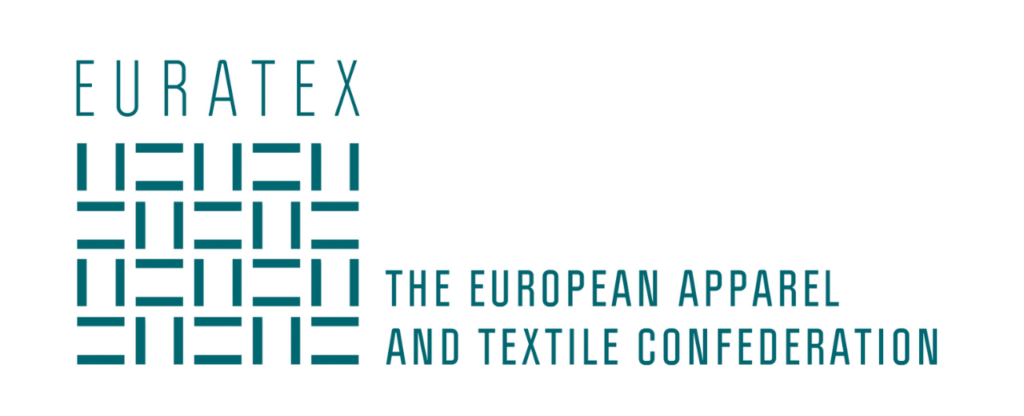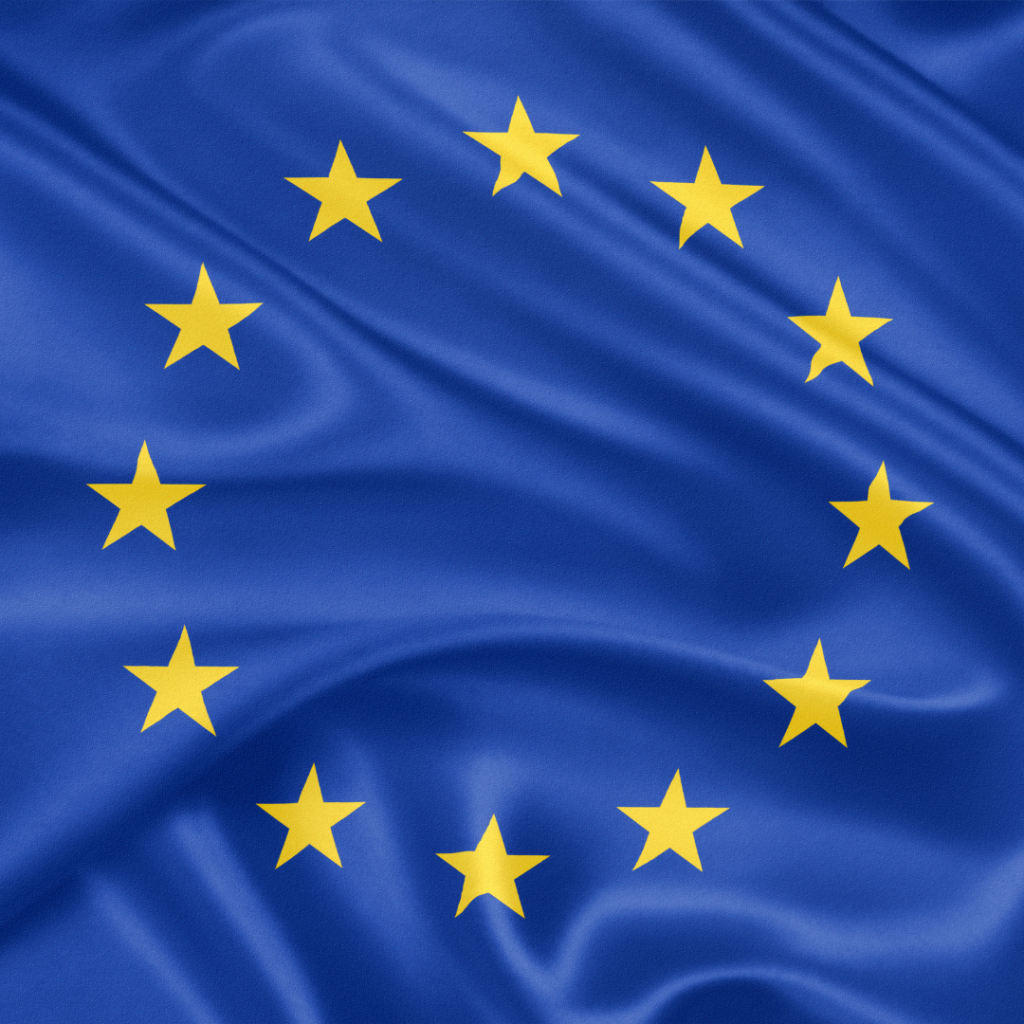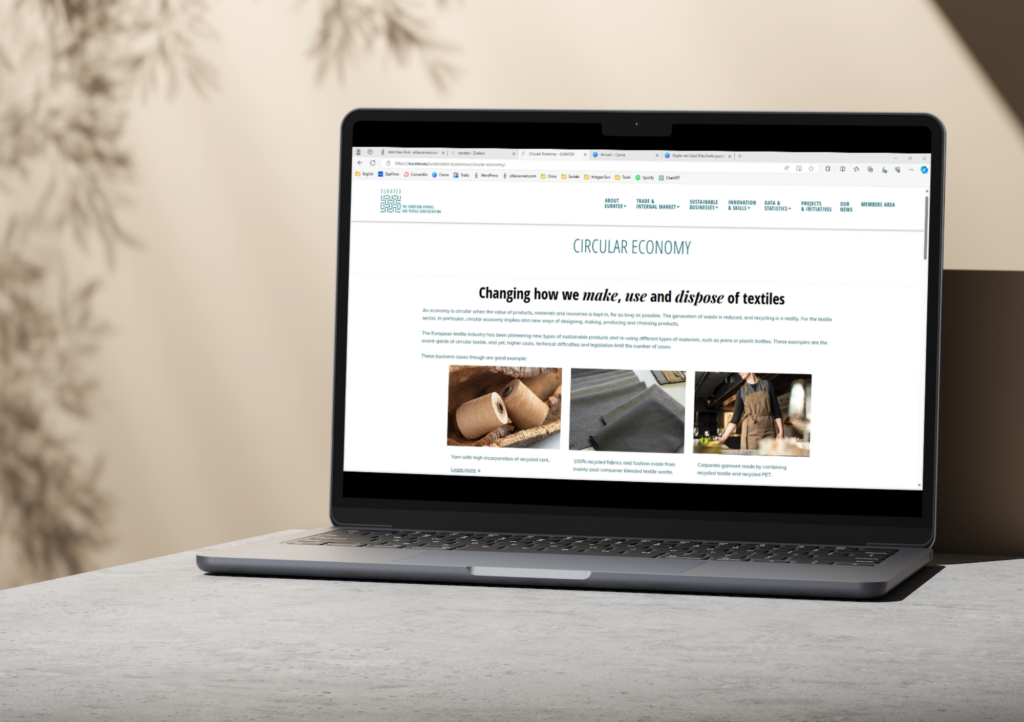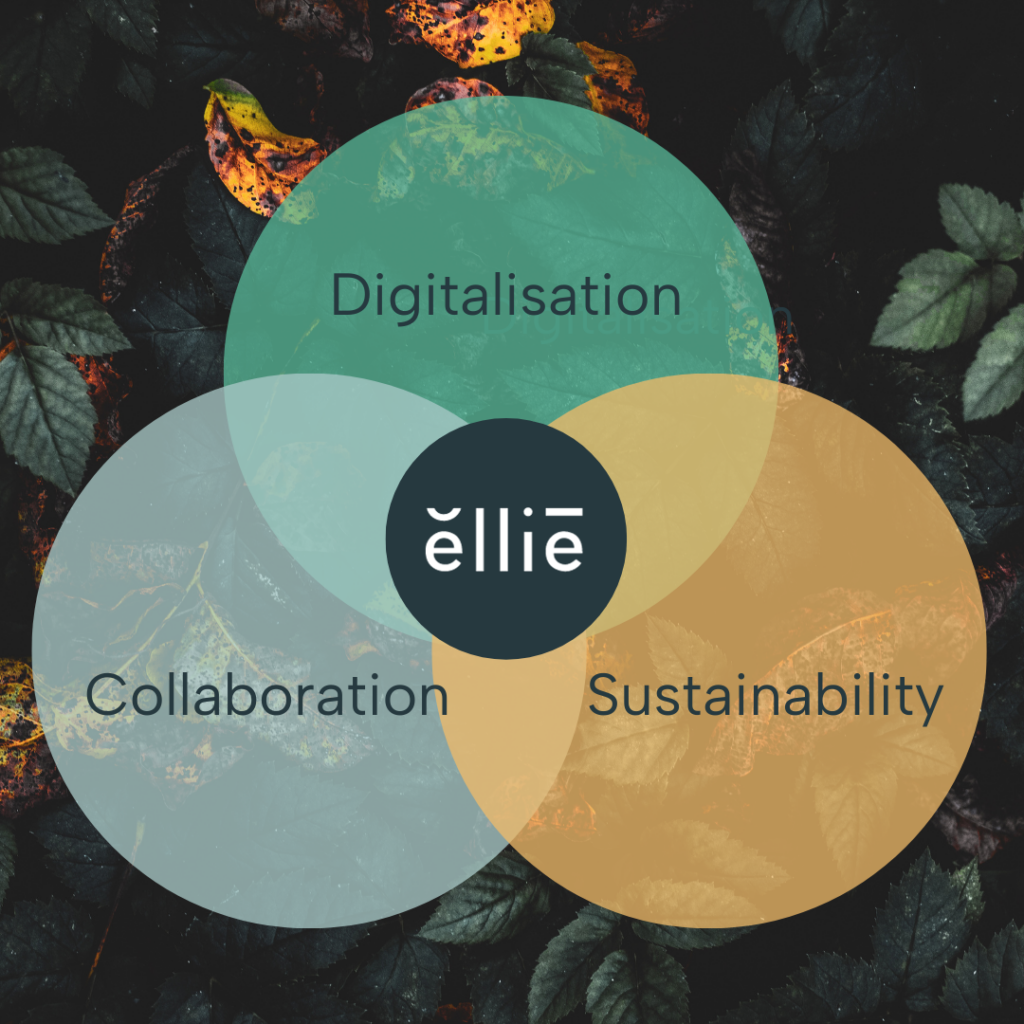For this 25th episode of our Ellie.Talks podcast, we had the honor to welcome Mr. Dirk Vantyghem, the Director General of Euratex. Euratex is the European Apparel and Textile Confederation, representing the textile and clothing industry’s interests in Europe. Their mission is to boost the European textile and clothing industry’s competitiveness and sustainability at both the European and international levels.
In this episode, Julie and Dirk delve into the complex topic of the competitiveness of the European textiles and fashion industry.
Key takeaways
- Euratex’s mission is to strengthen the competitiveness and sustainability of the European textile and clothing industry, both at European and international levels.
- The challenges faced by the European textile industry have prompted it to rethink its organization, particularly in terms of digitalization and sustainability.
- Euratex, like Ellie.Connect, emphasizes the importance of collaboration, inspiration, and information for the success of the textile industry.
- The RegioGreenTex program, run by Euratex, supports European textile SMEs in their investments in sustainability.
- To bridge the information gap facing the textile sector, Euratex is working to inform companies and prepare them for the changes ahead, while raising awareness of the textile industry in Europe.
- Believe in what you do, be honest with yourself, and break down internal barriers through collaboration to ensure the success of European textile companies.
Meet Dirk: A passionate family man from West Flanders
To describe himself, Dirk reveals a passion for his family and his West Flemish roots. With three decades of European experience, including 25 years in Chambers of Commerce before joining the textile sector, he explains that his role as the Director General of Euratex today is both dynamic and diverse.
Introducing Euratex, The European Textile Federation

Euratex was officially created in 1996 by the merger of the European Textile Federation and the European Apparel Federation to create a single body representing the European Textile and Apparel Association.
Euratex is headquartered in Brussels and represents the entire European textile value chain, covering everything from fiber production to final products, including home textiles, fashion, and technical textiles.
This federation is crucial, as the majority – 80% – of the rules governing companies in Belgium and Flanders, including those in the textile sector, are set at the European level. To influence these rules and promote the industry, it is necessary to have a presence at the European level. It is imperative that European Union decision-makers recognize the importance of the European textile industry, which comprises 192,000 companies, generates around €165 billion in sales, and employs 1.3 million people.
Anything but standard, a glimpse into a day at the Euratex Offices

In his role at Euratex, Dirk’s daily work is anything but standard. His primary responsibility is representing and safeguarding the interests of the vast and intricate European textile industry.
On a typical day, Dirk engages in external representation, communicating with EU officials and European Parliament members to address industry concerns. He also frequently speaks at events and conferences in Europe and abroad.
A significant part of his role involves fostering close relationships with Euratex’s extensive membership, which includes the entire European textile industry. This entails managing diverse interests within this large industry family and ensuring their voices are heard.
Despite being the Director General, Dirk actively oversees the daily operations of the Euratex office. This includes tasks like budgeting and supervising a 15-member team in Brussels. These diverse responsibilities keep him deeply engaged in a wide range of activities.
An industry in constant evolution
Dirk, as Director General since September 2019, has overseen a transformative period in the textile industry, facing challenges like the COVID-19 pandemic, lockdowns, and subsequent crises such as the war in Ukraine, energy shortages, inflation, and fluctuations in consumer confidence. Despite the hurdles, these challenges have prompted the European textile industry to reconsider its organization and operations, particularly in terms of digitalization and sustainability.
‘It’s a roller coaster. But at the same time, it also gives some opportunities to rethink the way we organize and the way we run our textile industry in Europe. So in every crisis, there’s an opportunity’. – Dirk
The textile industry is recognized by the European Commission as the second most globalized sector of the European economy. The European Union is actively promoting the dual transition of digitization and sustainability, essential for long-term competitiveness. Euratex supports this vision and helps companies adapt to these changes while maintaining their competitiveness on the world stage.
Towards a more sustainable industry

Europe is pushing the textile industry towards sustainability with the EU textile strategy, introduced a year and a half ago, addressing issues like waste, chemical usage, and traceability. Euratex supports this objective but sees the challenge in implementation, including adaptation and costs for textile companies. An international level playing field and market surveillance are essential to avoid imbalanced competition.
Dirk emphasizes that the EU textile strategy should evolve into a global one, involving textile industries worldwide, including Asia. Euratex promotes this approach in third countries like the US and South America. While supported by the European Commission, execution remains a challenge and a work in progress.
Textile strategies are emerging globally, including in China, the U.S., Brazil, and South Korea. Europe sets an example but faces the challenge of aligning these strategies in terms of standards and regulations because the work ahead is about reconciling and ensuring compatibility between European norms and what other regions are pursuing. However, the direction is positive and it is good to realize that there is a problem.
Focus on the 3 important pillars: Connect, Inspire, Inform

As Julie mentions, Ellie.Connect rests on three important pillars: Connect, Inspire, Inform. These three pillars are also very important in a company like Euratex.
1. Collaboration
Collaboration is vital for success in the textile industry. Dirk was surprised by the lack of collaboration when he joined Euratex. He stresses the need to foster cooperation across the textile value chain and the wider ecosystem, involving the chemical industry, machinery manufacturers, brands, and retailers. To navigate industry transitions, stakeholders must work together on technology, standards, and a level playing field. Euratex actively promotes this by welcoming partner companies that contribute significantly to their work, aligning with the European Commission’s industrial strategy, which emphasizes collective efforts for the industry’s future.
2. Inspiration
Regarding the ‘Inspiration’ pillar, Dirk mentions RegioGreenTex, a 12-million-euro EU-funded program (Ellie.Connect is one of the project partners!) RegioGreenTex’s goal is to support 25 European SMEs in their sustainability investments. It encourages these small businesses to scale up their efforts in areas like recycling and waste management, driving them toward becoming more sustainable textile companies. This initiative includes a regional dimension, involving textile regions across Europe, including Flanders, to create a shared vision for advancing the textile industry towards sustainability.

RegioGreenTex provides not only financial support but also facilitates connections, allowing companies to learn from each other. This collaborative environment is a source of inspiration for textile companies aiming to transition to sustainability within a competitive landscape. The project offers coaching, technical support, and various elements to ensure the successful implementation of their sustainability goals.
Beyond RegioGreenTex, Euratex is actively engaged in other initiatives and lobbies for additional funding from the European Commission. This funding is pivotal in supporting the industry’s transition, particularly for small and medium-sized enterprises (SMEs). The ultimate aim is to reorganize the industry, and Euratex collaborates closely with the European Commission to secure the essential support and resources for SMEs to transition successfully.
3. Information
The textile sector is faced with a major information deficit that merits our attention. Firstly, data relating to the textile industry, such as textile waste, is underdeveloped and needs to be improved.
The flow of information is essential in two directions:
Euratex’s mission is to inform and prepare companies for upcoming changes due to new legislation and standards, including those related to recycling and waste management, bridging the information gap between Europe and textile companies.
Conversely, it is equally crucial to educate Europe about the textile industry, its technology, and its possibilities. Euratex acts as a bridge, collecting information on the ground and presenting it in an understandable way to the European Commission.
To improve this process, the textile industry needs better organization, committees, councils, and stronger platforms for sharing information. Collaborative initiatives such as Ellie.Connect also play a vital role in solving this information problem.
Euratex’s Vision for the Textile Industry
The European textile industry stands at a crossroads, driven by changing legislation, geopolitics, and shifting consumer behavior. Success hinges on designing a robust business model for the future. Euratex focuses on three key areas:
- Creating a high-quality regulatory framework: Ensuring clear, coherent, and predictable legislation is vital, as textiles transition from being unregulated to highly regulated.
- Securing recognition and support: Convincing authorities at European, Belgian, Flemish, and local levels that textiles are a strategic sector in the economy, producing essentials like face masks, fashion, and furniture.
- Boosting demand for sustainable textiles: While the industry supplies sustainable products, the push for sustainability should also come from the consumer side, including public procurement that values high-quality, sustainable textiles, ideally made in Europe.
Dirk’s Valuable Lessons
Over his journey in the European bubble, Dirk has learned the importance of believing in what you do and being honest with yourself to stay motivated.
He values the mental flexibility that being Flemish brings, allowing him to navigate Europe’s complexity diplomatically. This adaptability and connection with different backgrounds have been essential for his success.
To finish, as a newcomer in the textile industry, Dirk finds it fascinating and full of potential. He believes in a promising future for European textile companies and emphasizes the need to break internal barriers and collaborate for success.
‘It sounds like a slogan, but I genuinely believe that there is a bright future for European textile companies.’ – Dirk
If this episode has inspired you, you can contact Euratex via Ellie.Connect.

